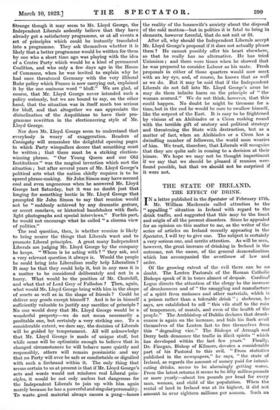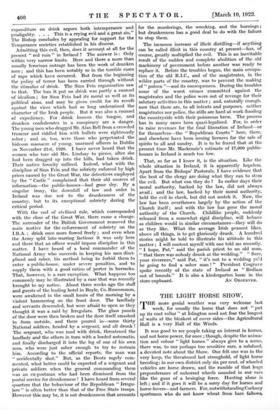THE STATE OF IRELAND.
THE EFFECT OF DRINK.
IN a letter published in the Spectator of February 17th, Mr. William Mackenzie called attention to the " appalling " situation in Ireland with regard to the drink traffic, and suggested that this may be the fount and origin of all the present disorders. Since he appealed for an opinion on this matter to me, as the writer of the series of articles on Ireland recently appearing in the Spectator, I will try to give one. The subject is certainly a very serious one, and merits attention. As'will be seen, however, the great increate of drinking in Ireland is the outcome, not the cause, of the general demoralization which has accompanied the overthrow of law and order.
Of the growing extent of the evil there can be no doubt. The Lenten Pastorals of the Roman Catholic Bishops speak of it in tones almost of despair. Cardinal Logue directs the attention of the clergy to the increase of drunkenness and of " the smuggling and manufacture of a spirit from molasses and other materials, which is a poison rather than a tolerable drink " ; shebeens, he says, are established to sell "this vile stuff to the ruia of temperance, of morals, and even of the health of the people." The Archbishop of Dublin declares that drunk- enness is again on the increase, and bids his flock avail themselves of the Lenten fast to free themselves from this "degrading vice." The Bishops of Armagh and Derry both denounce the traffic in illicit spirits "which has developed within the last few. years." Finally, Dr. Finegan, Bishop of Kilmore, devotes a considerable part of his Pastoral to this evil. "From statistics published in the newspapers," he says, "the state of Ireland, as regards the amount of money paid for intoxi- cating drinks, seems to be alarmingly getting worse.
From the latest returns it seems to be fifty million pounds or more yearly—about ten pounds per head for every man, woman, and child of the population. When the rental of land in Ireland was at its highest, it did not amount to over eighteen millions per annum. Such an expenditure on drink argues both intemperance and prodigality. . . . This is a crying evil and a great sin." The Bishop concludes by appealing for support for the Temperance societies established in his diocese.
Admitting this evil, then, does it account at all for the present "red ruin" in Ireland ? The answer is : Only within very narrow limits. Here and there a more than usually ferocious outrage has been the work of drunken men ; and this has been notably so in the terrible cases of rape which have occurred. But from the beginning the policy of terror has been carried through without the stimulus of drink. The Sinn Fein organization saw to that. The ban it put on drink was partly a counsel of idealism ; for Sinn Fein had its moral as well as its political aims, and may be given credit for its revolt against the vices which had so long undermined the character of the Irish people. But it was also a. counsel of expediency. For drink loosens the tongue, and drunken confederates in a conspiracy are a danger. The young men who dragged Mr. Alan Bell from a crowded tramcar and riddled him with bullets were righteously sober ; and so, too, were those who perpetrated the hideous massacre of young, unarmed officers in Dublin on November 21st, 1920. I have never heard that the women who tore old Mrs. Lindsay to pieces, after she had been dragged up into the hills, had taken drink.
Their native ferocity sufficed. Indeed, what with the discipline of Sinn Fein and the sobriety enforced by high prices caused by the Great War, the detectives employed by the " Castle " complained that their old sources of information—the public-houses—had gone dry. By a singular irony, the downfall of law and order in Ireland was due not to the drunkenness of the country, but to its exceptional sobriety during the critical period.
With the end of civilized rule, which corresponded with the close of the Great War, there came a change.
The surrender of the British Government removed the main motive for the enforcement of sobriety on the I.R.A. ; drink once more flowed freely ; and even when the Army split into warring factions it was only here and there that an officer would impose discipline in this matter. I have heard of a local commander of the National Army who succeeds in keeping his men disci- plined and sober, his method being to forbid them to enter a public-house, under severe penalties, and to supply them with a good ration of porter in barracks.
That, however, is a rare exception. What happens too commonly may be illustrated by a case that was recently brought to my notice. About three weeks ago the staff and guests of the leading hotel in Boyle, Co. Roscommon, were awakened in the small hours of the morning by a violent hammering on the front door. The landlady and servants descended, but were afraid to open as they thought it was a raid by Irregulars. The glass panels of the door were then broken and the door itself smashed in from outside, and there poured in—some thirty National soldiers, headed by a sergeant, and all drunk ! The sergeant, who was mad with drink, threatened the landlady and the others in turn with a loaded automatic, and finally discharged it into the leg of one of his own men, who were just sober enough to try to restrain him. According to the official reports, the man was "accidentally shot." But, as the Boots sagely com- mented, what better could be expected of a sergeant and private soldiers when the general commanding them was an ex-postman who had been dismissed from the postal service for drunkenness ! I have heard from several quarters that the behaviour of the Republican " Irregu- lars " is often better than that of the Free State troops. However this may be, it is not drunkenness that accounts for the murderings, the wrecking, and the burnings ; but drunkenness has a "good deal to do with the failure to stop them.
The immense increase of illicit distilling—if anything can be called illicit in this country at present—has, of course, greatly multiplied the evil. This is an inevitable result of the sudden and complete abolition of the old machinery of government before another was ready to replace it. Before the troubles began, the main occupd- tion of the old R.I.C., and of the magistrates, in the wilder parts of the country, was to prevent the making of" poteen "—and its consequences. During the troubles some of the worst crimes committed against the magistrates and the police were out of revenge for their salutary activities in this matter ; and, naturally enough, now that there are, to all intents and purposes, neither magistrates nor police, the stills are hard at work flooding the countryside with their poisonous brew. The process has in many cases been quasi-legalized. For, in order to raise revenues for the final liberation of Ireland—or for themselves—the "Republican Courts" here, there, and elsewhere have been issuing licences for the sale of spirits to all and sundry. It is to be feared that at the present time Mr. Mackenzie's estimate of 17,000 public- houses in Ireland is much too low.
That, so far as I know it, is the situation. Like the whole situation in Ireland, it is apparently hopeless. Apart from the Bishops' Pastorals, I have evidence that the best of the clergy are doing what they can to stem the evil. But what can they do ? In earlier days their moral authority, backed by the law, did not always avail ; and the law, backed by their moral authority, held the evil in check, but did not scotch it. Now, the law has been overthrown largely by the action of the Church itself; and with the law has gone the moral authority of the Church. Childlike people, suddenly released from a somewhat rigid discipline, will behave as children would in similar circumstances—they will do as they like. What the average Irish peasant likes, above all things, is to get gloriously drunk. A hundred stories might be told to illustrate his attitude in this matter ; I will content myself with one told me recently. "I hope, Pat," said the parish priest to an old man, "that there was nobody drunk at the wedding." "Sure, your riverence," said Pat, "it's not to a wedding ye'd be going to find a sober man ! " President Cosgrave spoke recently of the state of Ireland as "Bedlam out of bounds." It is also a kindergarten loose in the











































 Previous page
Previous page